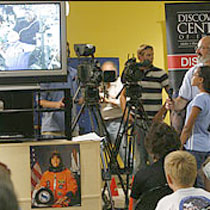2007年VOA标准英语-Endeavour Crew Holds Classes with Future Astron
搜索关注在线英语听力室公众号:tingroom,领取免费英语资料大礼包。
(单词翻译)
By Paul SiscoWashington
20 August 2007
Twenty young students gathered at the Challenger Space Center outside Washington DC last week for a firsthand lesson in space science, all the way from the orbiting Shuttle Endeavour. Voice of America's Paul Sisco reports.

Student gather for a classroom lesson from Shuttle Endeavour
"Good morning from international space station and space shuttle Endeavour," said Astronaut Barbara Morgan speaking to students assembled at the Challenger Center for Space Science education in Virginia.
The Center was founded by families of the astronauts killed in the 1986 Challenger disaster. Elementary school teacher Christa McAuliffe was among those killed.
Barbara Morgan is the first American teacher to return to space since the tragic2 accident -- and this was on the minds of many at Challenger Center.
June Scobee-Rodgers lost her husband on that flight. She said, "Barb1, we have been standing3 by, waiting for your signal from space for 21 years. These students are 'go' to ask you the questions from space … "
The young people wanted to know all about life on the shuttle: sleeping, dreaming, eating and more.
"And inside the hygiene4 kit5 we have, ah, we've got shavers. We have toothbrushes. We have toothpaste," said Morgan. "How do you brush your teeth in space?" one student asked.
 |
| Barbara Morgan and Alvin Drew |
Drew added "And when you're done you take a towel, and you spit out into a towel and then you try to dry out the towel out when you're done, because there's no sink to spit in, 'cause if there was, there wouldn't be any gravity to take it down the sink." Morgan remarked, "Al's dentist would be very proud of him."
Another student questioned "How will the experience on ISS [International Space Station] help continue and further the mission to Mars6?"
Drew answered, "It is a very appropriate question. Much of the research we are doing right now is trying to figure out how humans adapt to being in space. You need to understand right now we are already sending unmanned probes7 to Mars, and we're doing lots of science out there. The hard part is going to be how humans can adapt and live out in space for long periods of time. How do we deal with radiation? How do we deal with the fact that our bones don't do well, and how do we do things like recycle our resources out there like water and air and food."
With that, they wished them a great mission and safe trip home. Quite a day for these lucky young people. In unison, the students said: “Thank you Endeavour!"
 收听单词发音
收听单词发音 




